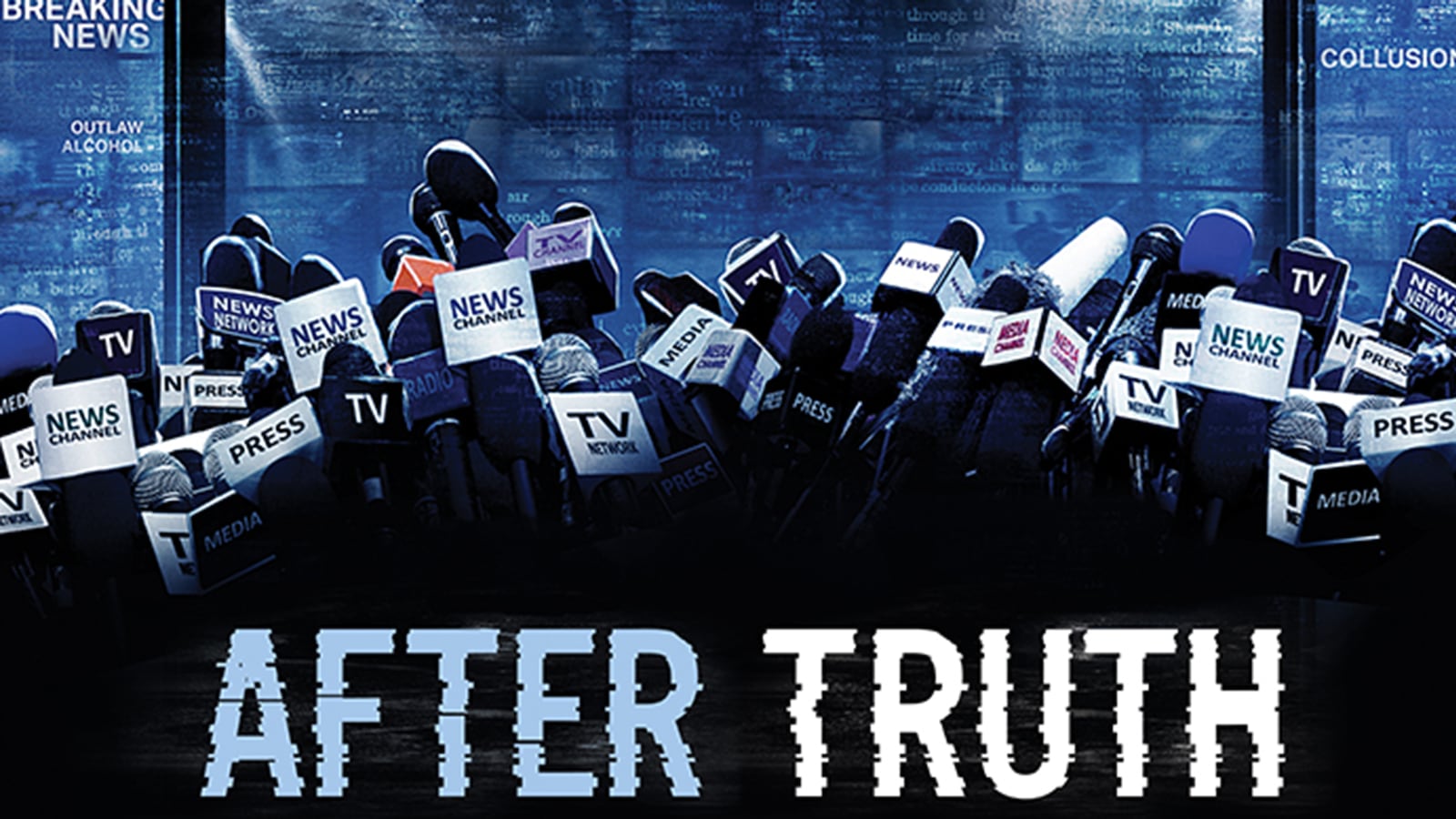Like his smirking partner in crime, right-wing con man Jacob Wohl, Republican lobbyist Jack Burkman loves to lie.
“Fake news is a weapon,” Burkman declares in After Truth, a disturbing, and occasionally enraging documentary—subtitled Disinformation and the Cost of Fake News—that premieres on HBO on Thursday at 9 p.m. “People believe it and reprint it,” Burkman elaborates. “It can be an effective tool…It’s become a tool of war… It’s like it’s World War I and it’s chemical weapons. People are using them, so you use them.”
Thus the square-jawed Burkman—coaxed into a rare instance of truth-telling by his interviewer, acclaimed documentary director Andrew Rossi—admits, or rather boasts, that he’s basically a war criminal in the battle of ideas.
“What is truth?” Burkman muses at another point, striking the pose of Deep Thinker in a zebra-striped chair in the sunken living room of his cheesily decorated suburban townhouse, which betrays a weakness for tchotchkes and faux French filigree. “If you study philosophy, there is no reality. There’s only perception… Most philosophy on all sides would tell you there’s never any such thing as truth to begin with.”
Rossi’s film is especially timely now that a novel coronavirus pandemic is spreading across the planet and the anxious American public is hard-pressed to sort out useful facts from harmful misinformation—much of it, until very recently, spewing forth from a flimflamming president who has told more than 16,000 whoppers since taking the oath of office, according to The Washington Post. (Burkman, natch, has been tweeting promiscuously this week that the perils of COVID-19 are simply a figment of the imagination of the “deep state.” On Thursday, Twitter suspended his account.)
Donald Trump aside, After Truth chronicles how shameless cynicism on the part of the purveyors of lies and conspiracy theories—along with fear and frustration on the part of their credulous consumers—has resulted in dangerous real-life consequences.
The fortysomething Burkman, for one, was run down by a black SUV driven by a disgruntled ex-employee who lured him to a hotel parking garage in March 2018, ostensibly to share secret FBI documents concerning the murder of Seth Rich, but instead shot him twice in the buttocks before running him over. The documentary captures Burkman’s painfully labored gait, his backside filling the screen as he negotiates the spiral staircase to the front door of his townhouse. He can hardly be blamed for employing a pistol-packing bodyguard, who makes several cameo appearances in the film.
The featured snake-oil salesmen also include such Trump-backing operatives as Jerome Corsi, Alex Jones, Sean Hannity, and Jack Posobiec, and also a couple of liberal Democrats, notably a left-leaning trickster named Matt Osborne, who used a $100,000 grant from LinkedIn billionaire Reid Hoffman to create a phony website touting a sham conservative crusade to outlaw alcohol sales in Alabama, in order to depress the Republican vote and help Democrat Doug Jones narrowly defeat accused pedophile Roy Moore in Alabama’s 2017 special Senate election.
In After Truth, Osborne—a plus-size millennial sporting an “ARMY” T-shirt—also uses the “chemical weapons” analogy favored by Burkman. “I felt empowered,” he crows, “to give the Republican Party a taste of its own medicine a little bit.” (In an on-camera interview, Sen. Jones condemns the hoax.)
An especially rewarding scene, meanwhile, shows Alex Jones verbally assaulting and pointing his finger in the face of CNN media reporter Oliver Darcy, who impressively doesn’t take the bait but merely asks his attacker with a wry smile, “How are you doing, Alex?” (The encounter, which Jones live-streamed, resulted in the Infowars hysteric being deplatformed from Twitter.)
Rossi also scored a coup with an emotional on-camera interview with the understandably press-shy Aaron Rich, the older brother of Seth, who law-enforcement authorities said was shot to death during a pre-dawn July 2016 robbery on a sidewalk near his Washington, D.C. home. The Rich family never received an apology after Fox News retracted a bogus report—eagerly and repeatedly promoted by Hannity. It suggested that Seth, a 27-year-old Democratic National Committee staffer, had given damaging DNC emails to WikiLeaks and was possibly murdered by a Democratic hit team.
“I have no clue why they won’t say it—pushing out false statements and not being willing to accept that they were false,” Aaron Rich tells Rossi. “It doesn’t make sense to me.”
The documentary also takes on Facebook sovereign Mark Zuckerberg—who declined to participate in an interview—for his refusal to stop providing a platform for poisonous (Russian-created, election-turning) propaganda. Zuckerberg stands superficially on free-speech grounds but more likely, argues tech journalist Kara Swisher, he’s unwilling to interfere because the expense of vetting millions of toxic posts would cut into Facebook’s billions in profits.
“What company wouldn’t shut down absolute provable false information?” demands Swisher, her eyes hidden behind aviator sunglasses. “They create the platform where it gets spread and go, ‘Uh. What can we do?’… They hide behind the First Amendment and they’re not the government. They can make choices. They just don’t want to… It’s just more convenient to do nothing. It’s more profitable to do nothing.”
After Truth’s most vivid example of destructive fabrication, however, is the Dec. 4, 2016, assault-rifle attack on Comet Ping Pong—the family-friendly D.C. pizza joint and live-music venue that right-wing troll Jack Posobiec and Infowars mouth-breather Alex Jones, along with thousands of conspiracy-mongers on Reddit and 4chan, claimed was the location of a secret pedophile sex ring run by Hillary Clinton, John Podesta, and George Soros.
“Think of the rest stop on the interstate highway. 4chan is a dirty restroom,” University of Pennsylvania communications Prof. Kathleen Hall Jamieson tells Rossi, metaphorically. “There’s no toilet paper on the toilet roll. The sink has not been cleaned in months. And think about the kinds of things you’ve seen on bathroom walls there.”
Indeed, weeks before Jones acolyte Edgar Madison Welch drove up from North Carolina and burst into the crowded restaurant in search of a nonexistent child sex dungeon—firing several rounds from his AR-15 and prompting a terrified mass evacuation—owner James Alefantis and his staff were already the targets of countless online and phoned-in death threats.
“‘We know where you live. We are coming to the restaurant. We’re coming to get you. You need to kill yourself,’” Alefantis recounts by way of enumerating the multiplying threats. “There was this specific one where someone said, ‘I’m gonna come to your restaurant with a machine gun, and kill everyone inside, and cut your guts out and watch you die on the floor.’ I was, like, this is scary.”
As more than 23,000 Reddit and 4chan users actively promoted the “Pizzagate” conspiracy, Jones warned his followers about “Satanic art” on the walls of Comet Ping Pong—a favorite neighborhood haunt not only for straight parents and kids but also for Washington’s LGBTQ community—and Posobiec live-streamed his dinnertime invasion of the suddenly embattled restaurant.
Alerted by a friend who was watching Posobiec’s Periscope feed online, Comet Ping Pong manager Bryce Reh confronts his unwelcome customer.
“I’ve turned it off,” Posobiec lies, repositioning his cellphone on the table.
“I understand that this, to you, is maybe like a game, but the staff has received death threats,” Reh tells him. “Are you reading these things?”
“I can’t control what somebody posts on the internet,” Posobiec disingenuously complains.
The documentary, which was executive produced by CNN’s chief media correspondent Brian Stelter, covers the waterfront of deception—occasionally with the cooperation of the deceivers. The pudgily red-faced, white-haired Corsi—who famously weaponized the birther conspiracy against President Barack Obama and, before that, the “Swift boat” canard against 2004 Democratic presidential nominee John Kerry—permitted Rossi’s cameras to memorialize one of his strategy sessions with like-minded operatives; Corsi also granted an interview beside a massive dining-room table shrouded in a yellowing lace tablecloth, and lit gloomily by an antique chandelier (heavier and more extravagant than Burkman’s), that evoked the lair of a sinister grandma.

“Chandeliers,” Rossi told The Daily Beast, “are a little bit of a visual motif in this film.”
Stelter—who was a New York Times media reporter when Rossi made Page One, the 2011 documentary that captured the newspaper’s struggles amid the internet onslaught that has helped kill dozens of less resilient publications—said Rossi “made people comfortable to talk, in the same way he did with me when I was in Page One.”
So, as they stage a press conference to smear Special Counsel Robert Mueller as a rapist—a scene that would be laughable if it weren’t so ominous—After Truth documents Burkman and Wohl concocting their lies in real time.
The film shows ace Daily Beast reporter Will Sommer holding Burkman and Wohl to account as they tell one fib after another concerning why Mueller’s supposed accuser (who actually had fled from Wohl at the airport) didn’t appear at the press conference as promised.
The press conference becomes a clown show of heckling reporters and panicky charlatans. How did this debacle come together in the first place?, Sommer asks Burkman.
“Let’s just say it’s synergistic,” Burkman answers as he flees.
In the back seat of an SUV, one of Rossi’s cameras aims at Jacob Wohl as he tries desperately to accentuate the positive.
“Are we trending?” Wohl asks. “That’s the real question. Are we trending?”


